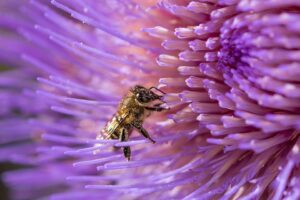Sneezing through spring? You’re not alone—and the battle against seasonal allergies is becoming more challenging for millions of Americans.
Warming global temperatures have extended North America’s pollen season by 20 days since 1990, according to a 2021 study. For the 26% of U.S. adults struggling with seasonal allergies, this means longer periods of discomfort.
“Pollen seasons are effectively year-round in some parts of the country,” says Melanie Carver, chief mission officer at the Asthma and Allergy Foundation of America.
Here’s what experts recommend to help you breathe easier during these extended allergy seasons.
Why Allergy Seasons Are Getting Worse
Climate change isn’t just affecting our weather—it’s changing how our bodies respond to the environment. Increasing temperatures and extreme weather events have created longer, more intense pollen seasons across the country.
In the U.S., seasonal allergies typically follow a predictable pattern:
- Spring: Tree pollen
- Summer: Grass pollen
- Fall: Weed pollen
But these once-distinct seasons are now blurring together, creating nearly continuous exposure for sensitive individuals.
Spotting Seasonal Allergy Symptoms
Not sure if you’re dealing with allergies or something else? Look for these common signs:
- Itchy, watery eyes
- Runny or stuffy nose
- Frequent sneezing
- Post-nasal drip
- Headaches
- Sore throat
- Coughing or wheezing
Important to know: You can develop allergies at any age—even if you’ve never had them before.
“It’s not uncommon for adults that have never experienced them before to find themselves managing seasonal allergies for the first time later in life,” explains Carver.
Moving to a new area with different plants can trigger new allergies, though Dr. Payel Gupta, spokesperson for the American College of Allergy, Asthma and Immunology, notes it typically takes about two years to develop sensitivities to local allergens.
Medication Strategies That Actually Work
When it comes to allergy medications, timing and consistency matter more than most people realize.
Dr. Arveen Bhasin, an allergist-immunologist at the Mayo Clinic, recommends starting your medication regimen at least two weeks before pollen season begins.
Common over-the-counter options include:
- Antihistamine pills
- Nasal sprays
- Eye drops
- Decongestants (with cautions)
The mistake most people make: Stopping nasal sprays after a few days. “It takes 10-14 days of consistent use for these sprays to reach maximum efficacy,” Dr. Bhasin explains.
Warning about decongestants: Never use them for more than three days. “I really don’t understand why they are over the counter, but they are,” says Dr. Gupta. “So people have to be careful.” Overuse can worsen congestion and may be dangerous for people with certain health conditions.
Simple Home Changes That Reduce Symptoms
Since Americans spend about 90% of time indoors, making your home a pollen-free sanctuary is crucial.
Try these expert-recommended steps:
- Keep windows closed and run air conditioning
- Change air filters regularly
- Wear a mask outside when pollen counts are high
- Remove shoes at the door
- Shower and change clothes when coming inside
- Use appropriately-sized air purifiers
“Inflammation and irritation are caused by pollen sitting on the surface of your skin or inside your nose and eyes,” explains Dr. Gupta. These simple habits can dramatically reduce your exposure.
When It’s Time to See an Allergist
If you’ve tried over-the-counter remedies and environmental changes without relief, don’t suffer needlessly.
“There are so many ways we can help you feel more comfortable,” says Dr. Gupta.
An allergist might recommend:
- Prescription-strength medications
- Allergy immunotherapy (shots)
- Sublingual treatments (under-the-tongue drops)
These treatments can provide longer-term control rather than just managing symptoms day by day.
With pollen seasons growing longer and more intense, taking a proactive approach to managing your seasonal allergies is more








